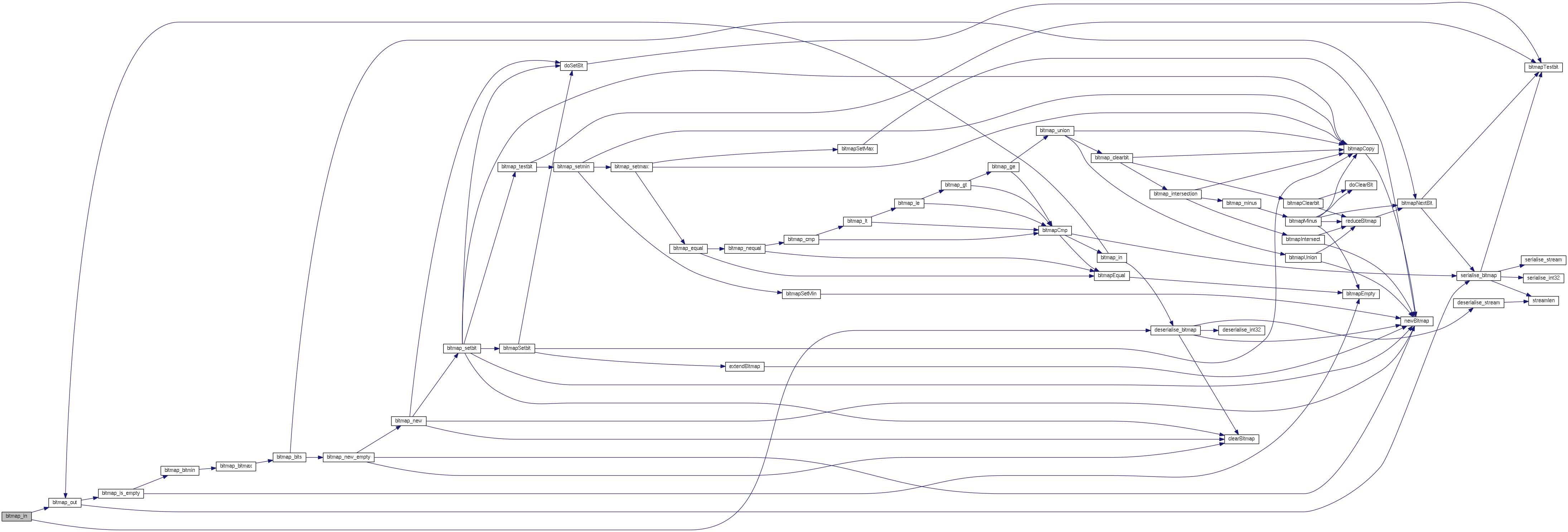Define bitmap datatypes. More...
#include "postgres.h"#include "funcapi.h"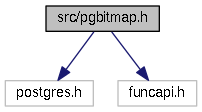
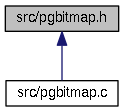
Go to the source code of this file.
Data Structures | |
| struct | Bitmap |
Macros | |
| #define | BITMAP_DATATYPES 1 |
| #define | USE_64_BIT 1 |
| #define | ELEMBITS 64 |
| #define | DBG_ELEMS 0 |
| #define | SETCANARY(b) |
| #define | CHKCANARY(b) true |
| #define | CANARYELEM |
| #define | BITZERO(x) ((x) & 0xffffffffffffffc0) |
| #define | BITSET_ELEM(x) ((x) >> 6) |
| #define | BITSET_BIT(x) (x & 0x3f) |
| #define | ARRAYELEMS(min, max) (((max - BITZERO(min)) >> 6) + 1) |
| #define | MIN(a, b) ((a < b)? a: b) |
| #define | MAX(a, b) ((a > b)? a: b) |
| #define | DatumGetBitmap(x) ((Bitmap *) PG_DETOAST_DATUM(DatumGetPointer(x))) |
| #define | PG_GETARG_BITMAP(x) |
| #define | PG_RETURN_BITMAP(x) PG_RETURN_POINTER(x) |
Typedefs | |
| typedef uint64 | bm_int |
| typedef struct Bitmap | Bitmap |
| typedef unsigned char | boolean |
Functions | |
| bool | bitmapTestbit (Bitmap *bitmap, int32 bit) |
| Bitmap * | bitmapCopy (Bitmap *bitmap) |
| Datum | bitmap_in (FunctionCallInfo fcinfo) |
| Datum | bitmap_out (FunctionCallInfo fcinfo) |
| Datum | bitmap_is_empty (FunctionCallInfo fcinfo) |
| Datum | bitmap_bits (FunctionCallInfo fcinfo) |
| Datum | bitmap_new_empty (FunctionCallInfo fcinfo) |
| Datum | bitmap_new (FunctionCallInfo fcinfo) |
| Datum | bitmap_bitmin (FunctionCallInfo fcinfo) |
| Datum | bitmap_bitmax (FunctionCallInfo fcinfo) |
| Datum | bitmap_setbit (FunctionCallInfo fcinfo) |
| Datum | bitmap_testbit (FunctionCallInfo fcinfo) |
| Datum | bitmap_setmin (FunctionCallInfo fcinfo) |
| Datum | bitmap_setmax (FunctionCallInfo fcinfo) |
| Datum | bitmap_equal (FunctionCallInfo fcinfo) |
| Datum | bitmap_nequal (FunctionCallInfo fcinfo) |
| Datum | bitmap_union (FunctionCallInfo fcinfo) |
| Datum | bitmap_clearbit (FunctionCallInfo fcinfo) |
| Datum | bitmap_intersection (FunctionCallInfo fcinfo) |
| Datum | bitmap_minus (FunctionCallInfo fcinfo) |
| Datum | bitmap_lt (FunctionCallInfo fcinfo) |
| Datum | bitmap_le (FunctionCallInfo fcinfo) |
| Datum | bitmap_gt (FunctionCallInfo fcinfo) |
| Datum | bitmap_ge (FunctionCallInfo fcinfo) |
| Datum | bitmap_cmp (FunctionCallInfo fcinfo) |
Detailed Description
Define bitmap datatypes.
Macro Definition Documentation
◆ ARRAYELEMS
| #define ARRAYELEMS | ( | min, | |
| max | |||
| ) | (((max - BITZERO(min)) >> 6) + 1) |
Gives the number of array elements in a Bitmap that runs from element min to element max.
- Parameters
-
min max
- Returns
- The number of elements in the bitmap.
◆ BITMAP_DATATYPES
| #define BITMAP_DATATYPES 1 |
Prevent this header from being included multiple times.
◆ BITSET_BIT
| #define BITSET_BIT | ( | x | ) | (x & 0x3f) |
Gives the index into bitmasks for the bit specified in x.
- Parameters
-
x The bit in question
- Returns
- The bitmask index
◆ BITSET_ELEM
| #define BITSET_ELEM | ( | x | ) | ((x) >> 6) |
Gives the index of the word for a given bit, assuming bitmin is zero.
- Parameters
-
x The bit in question
- Returns
- The array index of the bit.
◆ BITZERO
| #define BITZERO | ( | x | ) | ((x) & 0xffffffffffffffc0) |
Gives the bitmask index for the bitzero value of a Bitmap. This is part of the "normalisation" process for bitmap ranges. This process allows unlike bitmaps to be more easily compared by forcing bitmap indexes to be normalised around 32 or 64 bit word boundaries.
- Parameters
-
x The bitzero value of a bitmap
- Returns
- The bitmask index representing x.
◆ DatumGetBitmap
| #define DatumGetBitmap | ( | x | ) | ((Bitmap *) PG_DETOAST_DATUM(DatumGetPointer(x))) |
Provide a macro for getting a bitmap datum.
◆ ELEMBITS
| #define ELEMBITS 64 |
Use 64-bit words.
◆ MAX
| #define MAX | ( | a, | |
| b | |||
| ) | ((a > b)? a: b) |
Return the larger of a or b. Note that expressions a and b may be evaluated more than once.
- Parameters
-
a b
- Returns
- The smaller value of a or b.
◆ MIN
| #define MIN | ( | a, | |
| b | |||
| ) | ((a < b)? a: b) |
Return the smaller of a or b. Note that expressions a and b may be evaluated more than once.
- Parameters
-
a b
- Returns
- The smaller value of a or b.
◆ PG_GETARG_BITMAP
| #define PG_GETARG_BITMAP | ( | x | ) |
Provide a macro for dealing with bitmap arguments.
◆ PG_RETURN_BITMAP
| #define PG_RETURN_BITMAP | ( | x | ) | PG_RETURN_POINTER(x) |
Provide a macro for returning bitmap results.
◆ USE_64_BIT
| #define USE_64_BIT 1 |
Use 64-bit word definitions throughout.
Typedef Documentation
◆ Bitmap
A bitmap is stored as an array of integer values. Note that the size of a Bitmap structure is determined dynamically at run time as the size of the array is only known then.
◆ bm_int
| typedef uint64 bm_int |
bm_int is the bitmap integer type (a 64-bit value).
◆ boolean
| typedef unsigned char boolean |
Defines a boolean type to make our code more readable.
Function Documentation
◆ bitmap_bitmax()
| Datum bitmap_bitmax | ( | FunctionCallInfo | fcinfo | ) |
bitmap_bitmax(bitmap bitmap) returns boolean Return the highest bit set in the bitmap, or NULL if none are set. This relies on bitmap->bitmax always identifying the highest numbered bit in the bitset, unless the bitmap is empty.
- Parameters
-
fcinfo Params as described_below
bitmap bitmapThe bitmap being examined.
- Returns
integerThe lowest bit set in the bitmap or NULL if there are no bits set.
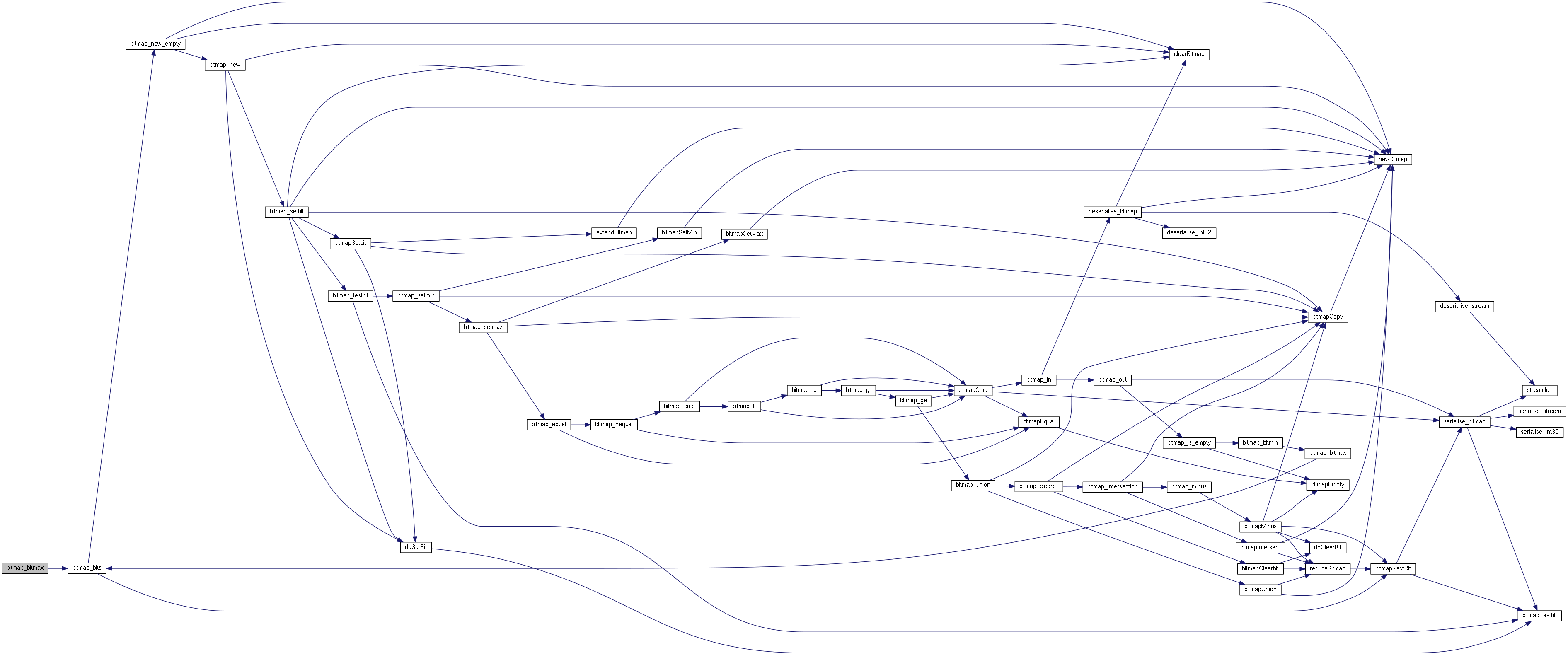
◆ bitmap_bitmin()
| Datum bitmap_bitmin | ( | FunctionCallInfo | fcinfo | ) |
bitmap_bitmin(bitmap bitmap) returns boolean Return the lowest bit set in the bitmap, or NULL if none are set. This relies on bitmap->bitmin always identifying the lowest numbered bit in the bitset, unless the bitmap is empty.
- Parameters
-
fcinfo Params as described_below
bitmap bitmapThe bitmap being examined.
- Returns
integerThe lowest bit set in the bitmap or NULL if there are no bits set.
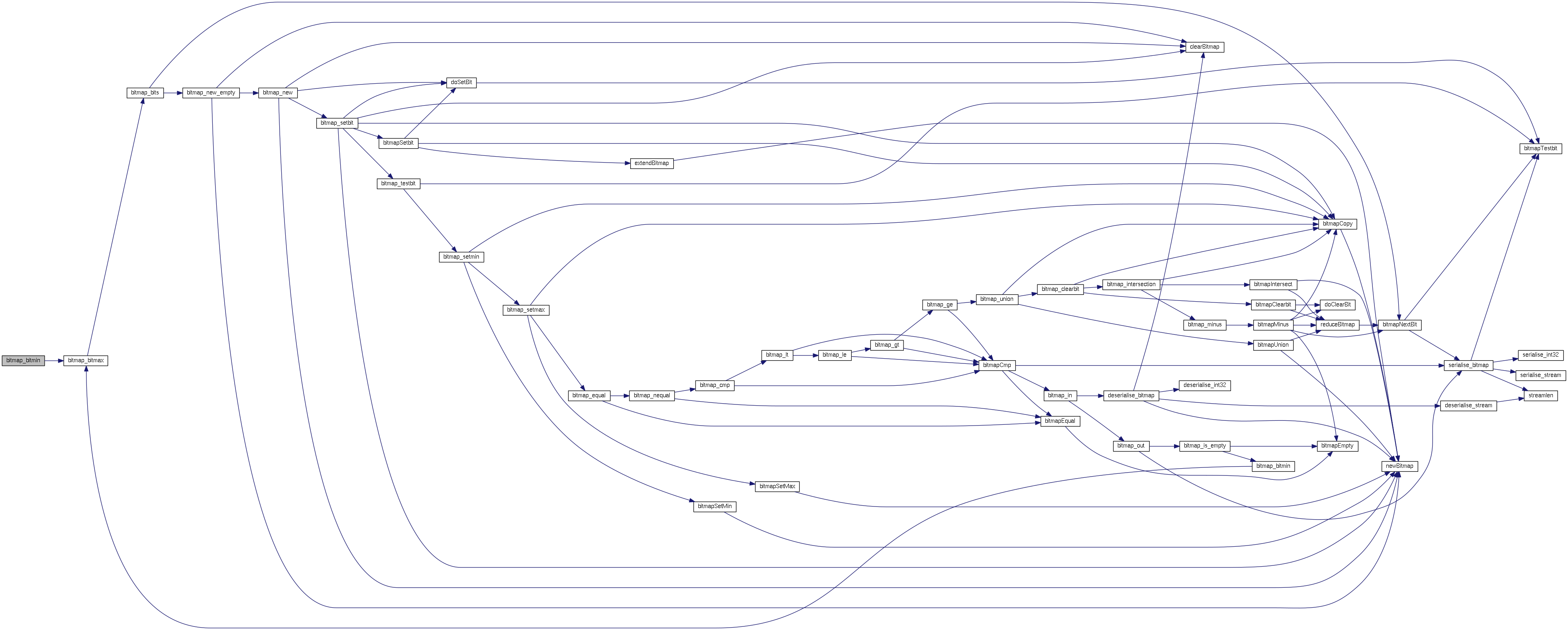
◆ bitmap_bits()
| Datum bitmap_bits | ( | FunctionCallInfo | fcinfo | ) |
bitmap_bits(name text) returns setof int4 Return the set of all bits set in the specified Bitmap.
- Parameters
-
fcinfo name textThe name of the bitmap.
- Returns
setof int4The set of bits that are set in the bitmap.
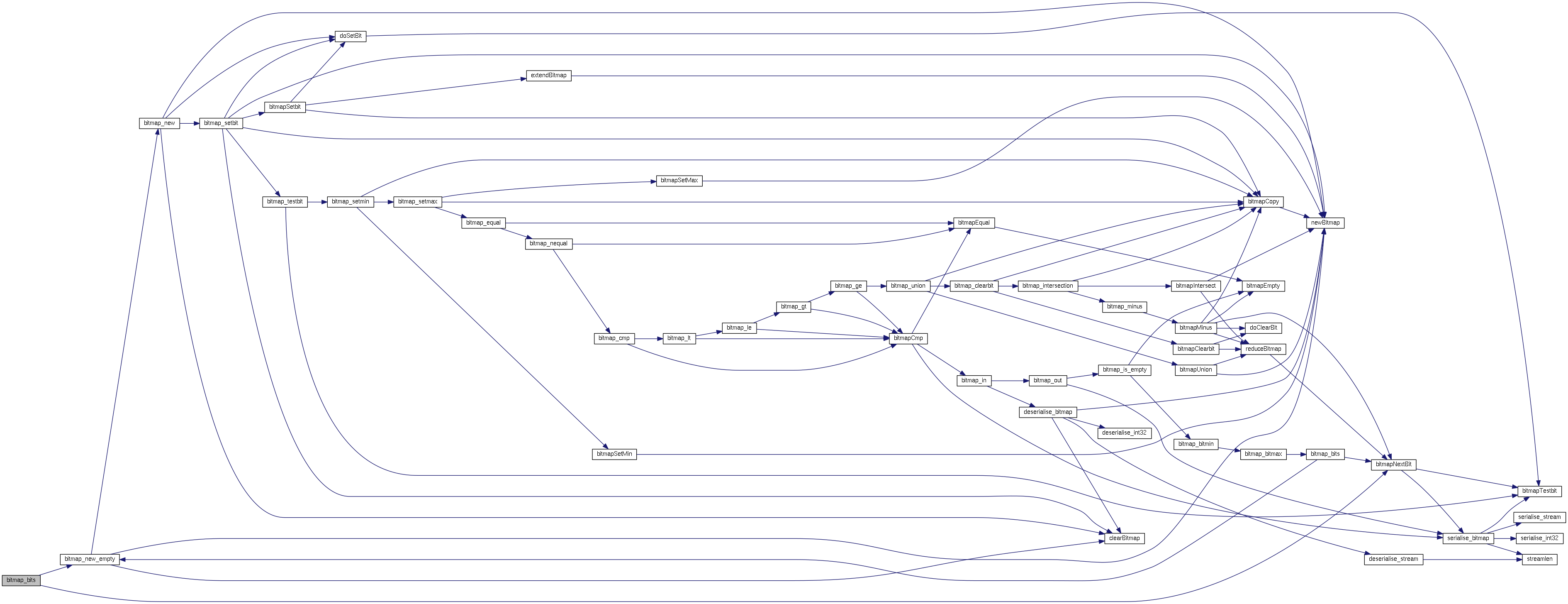
◆ bitmap_clearbit()
| Datum bitmap_clearbit | ( | FunctionCallInfo | fcinfo | ) |
bitmap_clearbit(bitmap bitmap, bit int4) returns bool Clear the given bit in the bitmap, returning FALSE.
- Parameters
-
fcinfo Params as described_below
bitmap bitmapThe bitmap to be manipulated.
bitno int4The bitnumber to be set.
- Returns
boolTRUE

◆ bitmap_cmp()
| Datum bitmap_cmp | ( | FunctionCallInfo | fcinfo | ) |
bitmap_cmp(bitmap1 bitmap, bitmap2 bitmap) returns bool Return result of comparison of bitmap1's string representation with bitmap2's.
- Parameters
-
fcinfo Params as described_below
bitmap1 bitmapThe first bitmap
bitmap2 bitmapThe second bitmap
- Returns
int4result of comparison
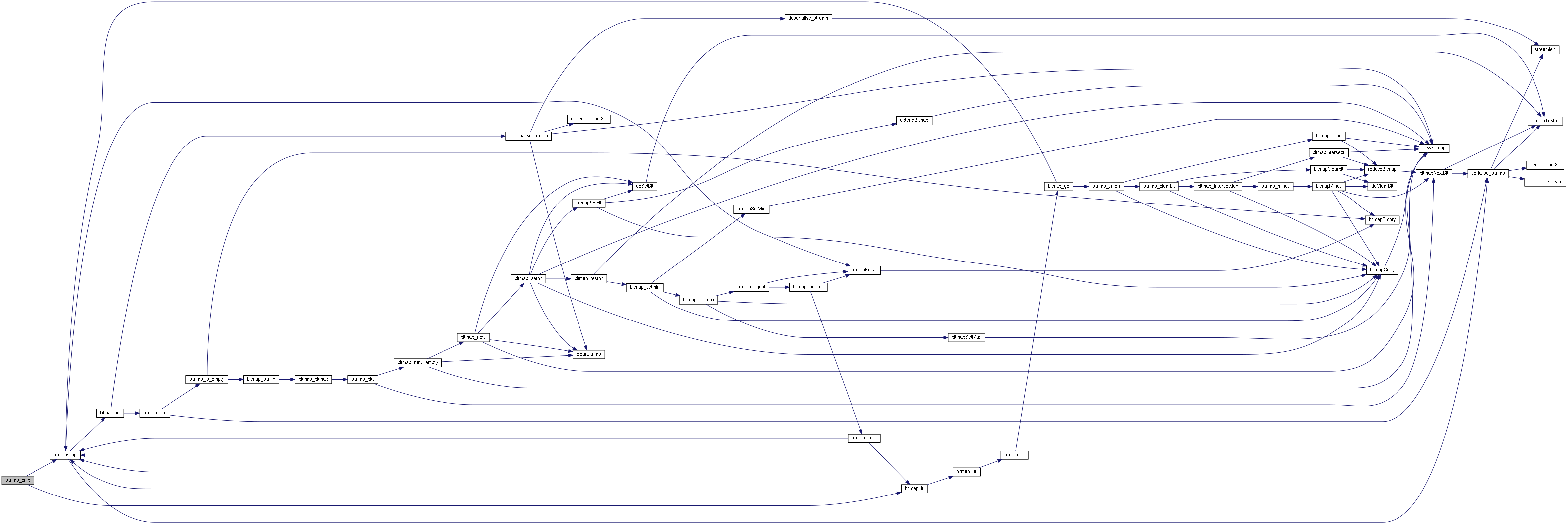
◆ bitmap_equal()
| Datum bitmap_equal | ( | FunctionCallInfo | fcinfo | ) |
bitmap_equal(bitmap1 bitmap, bitmap2 bitmap) returns bool Return true if the bitmaps are equivalent,
- Parameters
-
fcinfo Params as described_below
bitmap1 bitmapThe first bitmap
bitmap2 bitmapThe second bitmap
- Returns
booltrue if the bitmaps contain the same bits.
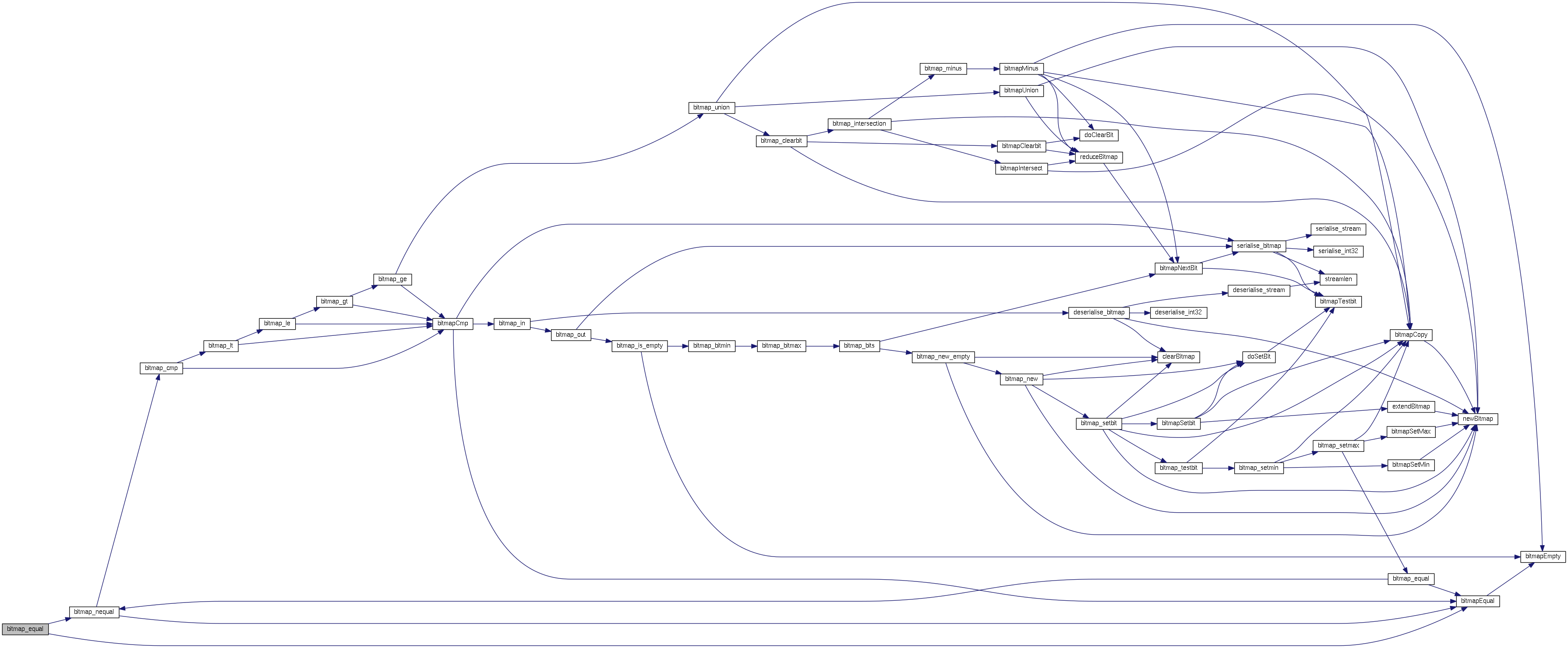
◆ bitmap_ge()
| Datum bitmap_ge | ( | FunctionCallInfo | fcinfo | ) |
bitmap_ge(bitmap1 bitmap, bitmap2 bitmap) returns bool Return true if bitmap1's string representation should be sorted later than, or the same as, bitmap2's.
- Parameters
-
fcinfo Params as described_below
bitmap1 bitmapThe first bitmap
bitmap2 bitmapThe second bitmap
- Returns
booltrue unless the bitmaps contain the same bits.

◆ bitmap_gt()
| Datum bitmap_gt | ( | FunctionCallInfo | fcinfo | ) |
bitmap_gt(bitmap1 bitmap, bitmap2 bitmap) returns bool Return true if bitmap1's string representation should be sorted later than bitmap2's.
- Parameters
-
fcinfo Params as described_below
bitmap1 bitmapThe first bitmap
bitmap2 bitmapThe second bitmap
- Returns
booltrue unless the bitmaps contain the same bits.

◆ bitmap_in()
| Datum bitmap_in | ( | FunctionCallInfo | fcinfo | ) |
◆ bitmap_intersection()
| Datum bitmap_intersection | ( | FunctionCallInfo | fcinfo | ) |
bitmap_intersection(bitmap1 bitmap, bitmap2 bitmap) returns bitmap Return the intersection of 2 bitmaps. This can be used as an aggregate function in which case the bitmap1 parameter will be null for the first call. In this case simply return the second argument.
- Parameters
-
fcinfo Params as described_below
bitmap1 bitmapThe first bitmap
bitmap2 bitmapThe second bitmap
- Returns
bitmapthe intersection of the two bitmaps.

◆ bitmap_is_empty()
| Datum bitmap_is_empty | ( | FunctionCallInfo | fcinfo | ) |
bitmap_is_empty(bitmap bitmap) returns boolean Predicate to identify whether a bitmap is empty or not.
- Parameters
-
fcinfo Params as described_below
bitmap bitmapThe bitmap being examined. bitmap value.
- Returns
booleantrue, if the bitmap has no bits.
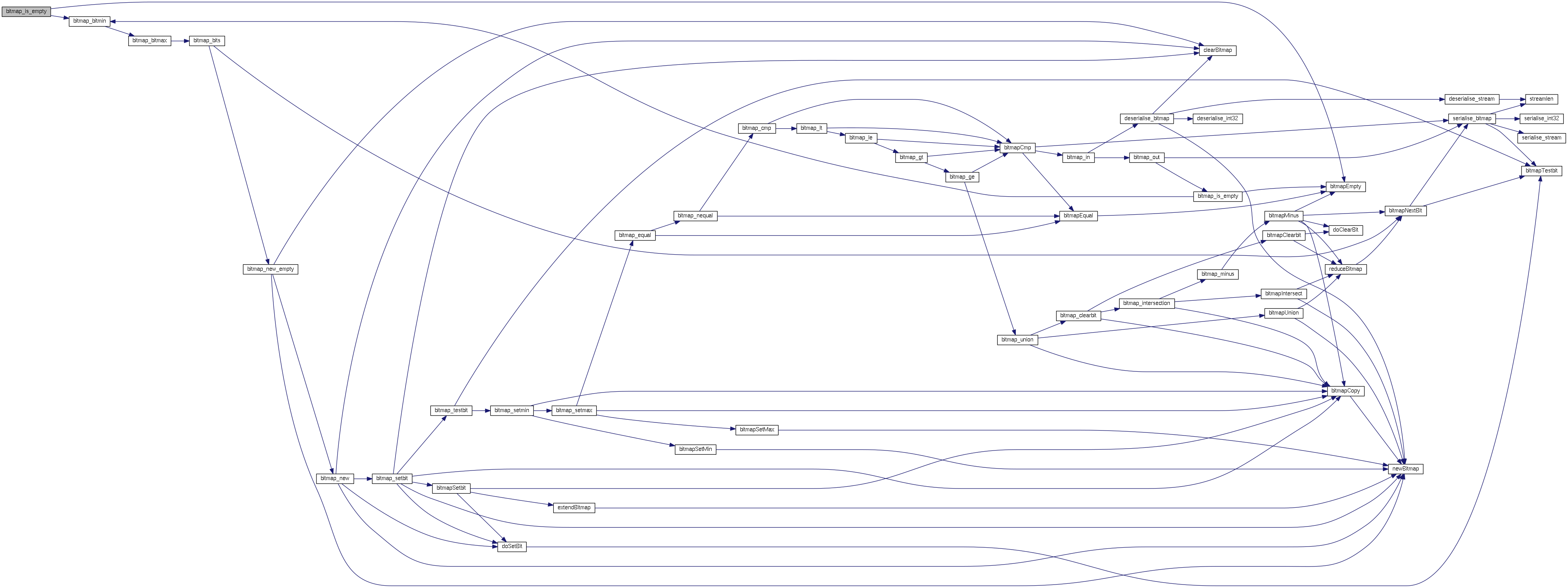
◆ bitmap_le()
| Datum bitmap_le | ( | FunctionCallInfo | fcinfo | ) |
bitmap_le(bitmap1 bitmap, bitmap2 bitmap) returns bool Return true if bitmap1's string representation should be sorted earlier than, or the same as, bitmap2's.
- Parameters
-
fcinfo Params as described_below
bitmap1 bitmapThe first bitmap
bitmap2 bitmapThe second bitmap
- Returns
booltrue unless the bitmaps contain the same bits.

◆ bitmap_lt()
| Datum bitmap_lt | ( | FunctionCallInfo | fcinfo | ) |
bitmap_lt(bitmap1 bitmap, bitmap2 bitmap) returns bool Return true if bitmap1's string representation should be sorted earlier than bitmap2's.
- Parameters
-
fcinfo Params as described_below
bitmap1 bitmapThe first bitmap
bitmap2 bitmapThe second bitmap
- Returns
booltrue unless the bitmaps contain the same bits.

◆ bitmap_minus()
| Datum bitmap_minus | ( | FunctionCallInfo | fcinfo | ) |
bitmap_minus(bitmap1 bitmap, bitmap2 bitmap) returns bitmap Return the bitmap1 with all bits from bitmap2 subtracted (cleared) from it.
- Parameters
-
fcinfo Params as described_below
bitmap1 bitmapThe first bitmap
bitmap2 bitmapThe second bitmap
- Returns
bitmapthe subtraction of the two bitmaps.
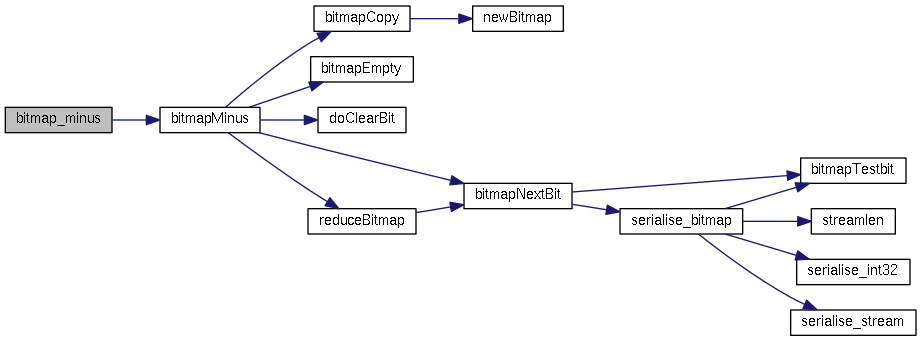
◆ bitmap_nequal()
| Datum bitmap_nequal | ( | FunctionCallInfo | fcinfo | ) |
bitmap_nequal(bitmap1 bitmap, bitmap2 bitmap) returns bool Return true if the bitmaps are not equivalent,
- Parameters
-
fcinfo Params as described_below
bitmap1 bitmapThe first bitmap
bitmap2 bitmapThe second bitmap
- Returns
booltrue unless the bitmaps contain the same bits.
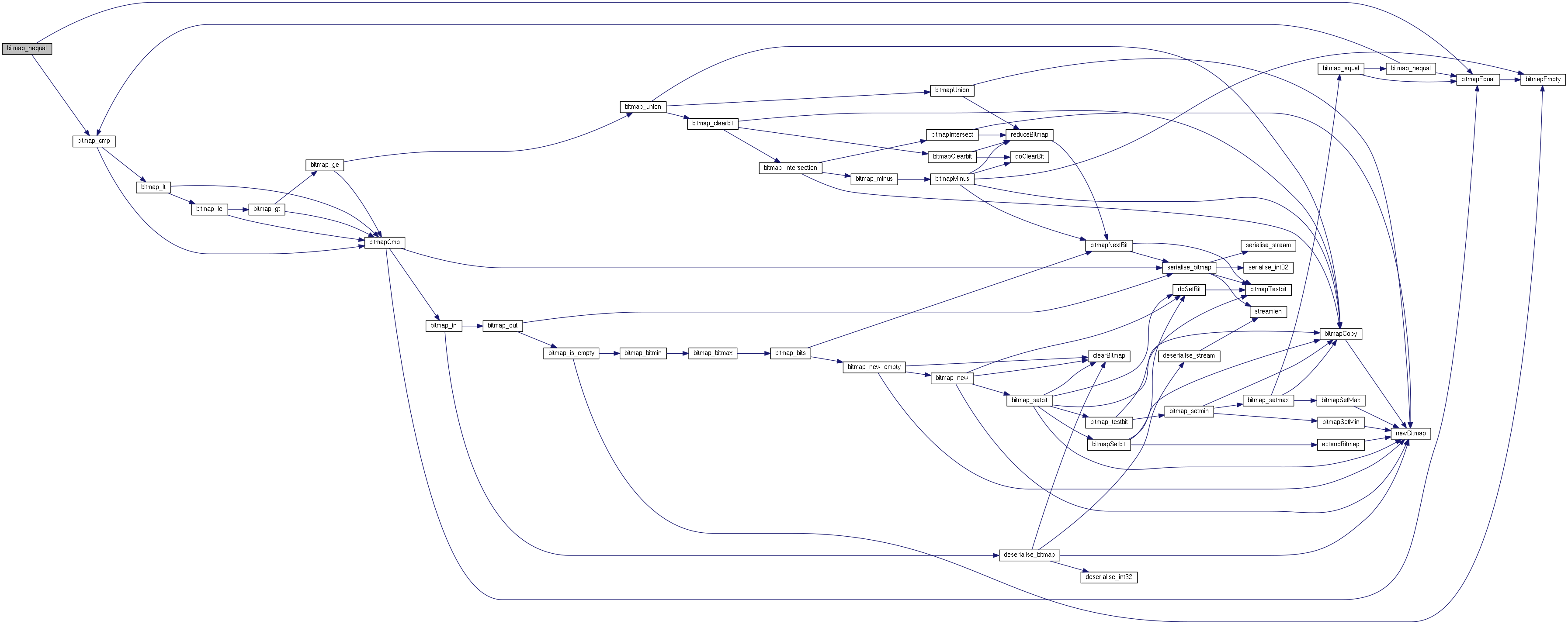
◆ bitmap_new()
| Datum bitmap_new | ( | FunctionCallInfo | fcinfo | ) |
bitmap_new() returns bitmap; Create or re-initialise a Bitmap, for dealing with a named range of values.
- Parameters
-
fcinfo Params as described_below
bitno int32The first integer value to be recorded in the bitmap
- Returns
Bitmapthe newly allocated bitmap
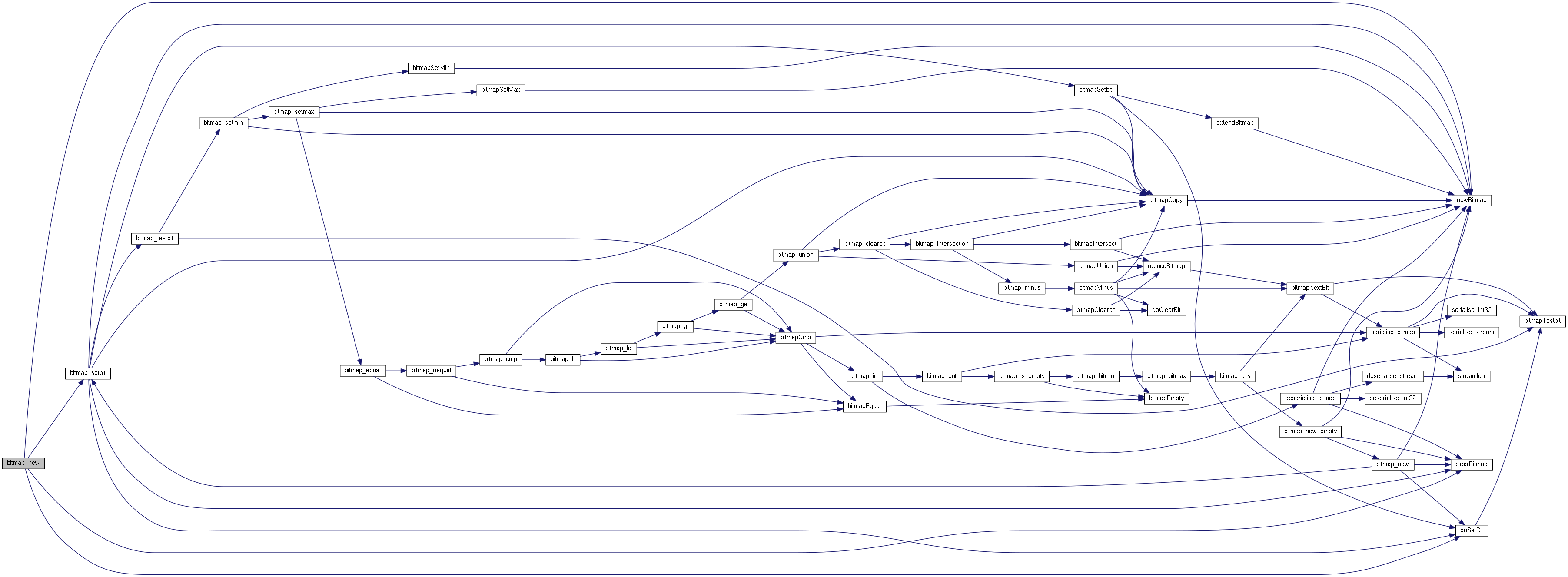
◆ bitmap_new_empty()
| Datum bitmap_new_empty | ( | FunctionCallInfo | fcinfo | ) |
bitmap_new_empty() returns bitmap; Create an empty Bitmap, for dealing with a named range of values.
- Parameters
-
fcinfo Params as described_below
- Returns
Bitmapthe newly allocated bitmap
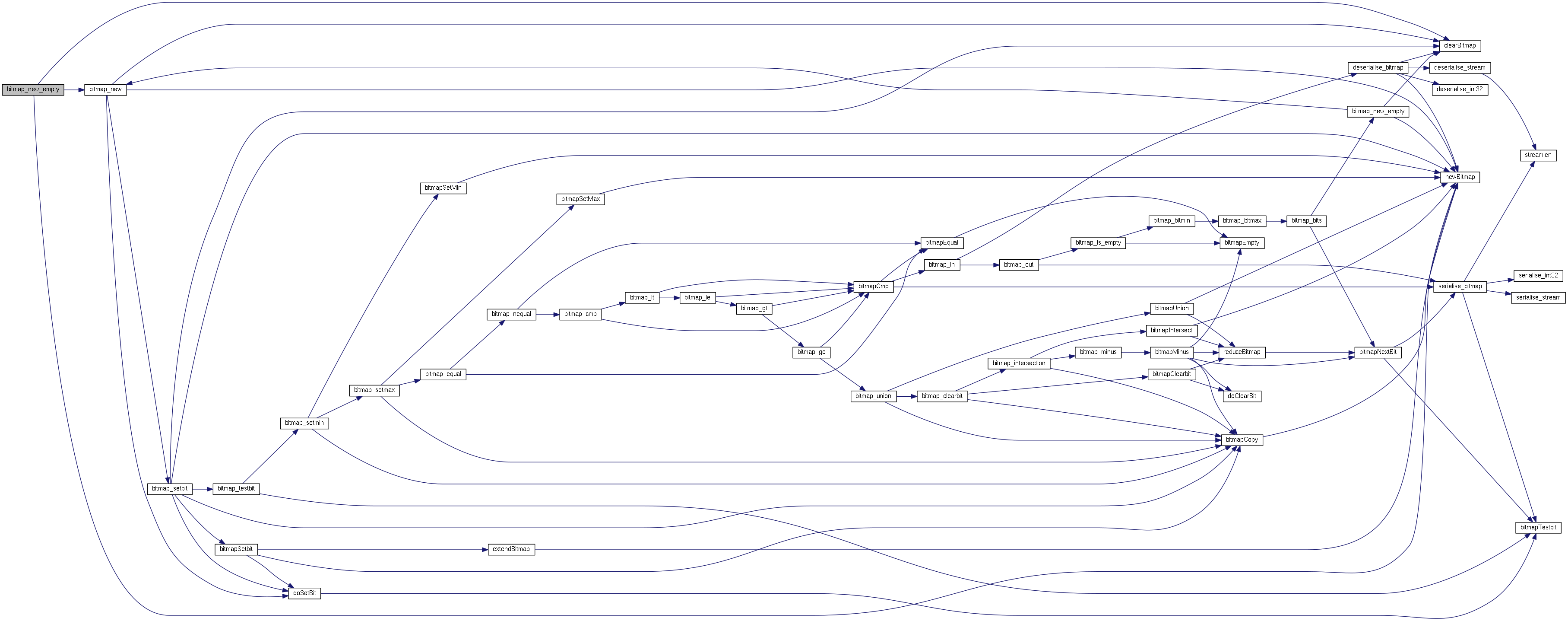
◆ bitmap_out()
| Datum bitmap_out | ( | FunctionCallInfo | fcinfo | ) |
bitmap_out(bitmap bitmap) returns text Create a (base64) text representation of a bitmap.
- Parameters
-
fcinfo Params as described_below
bitmap bitmapA base64 serialiastion of a bitmap value.
- Returns
cstringthe newly serialised text stream.
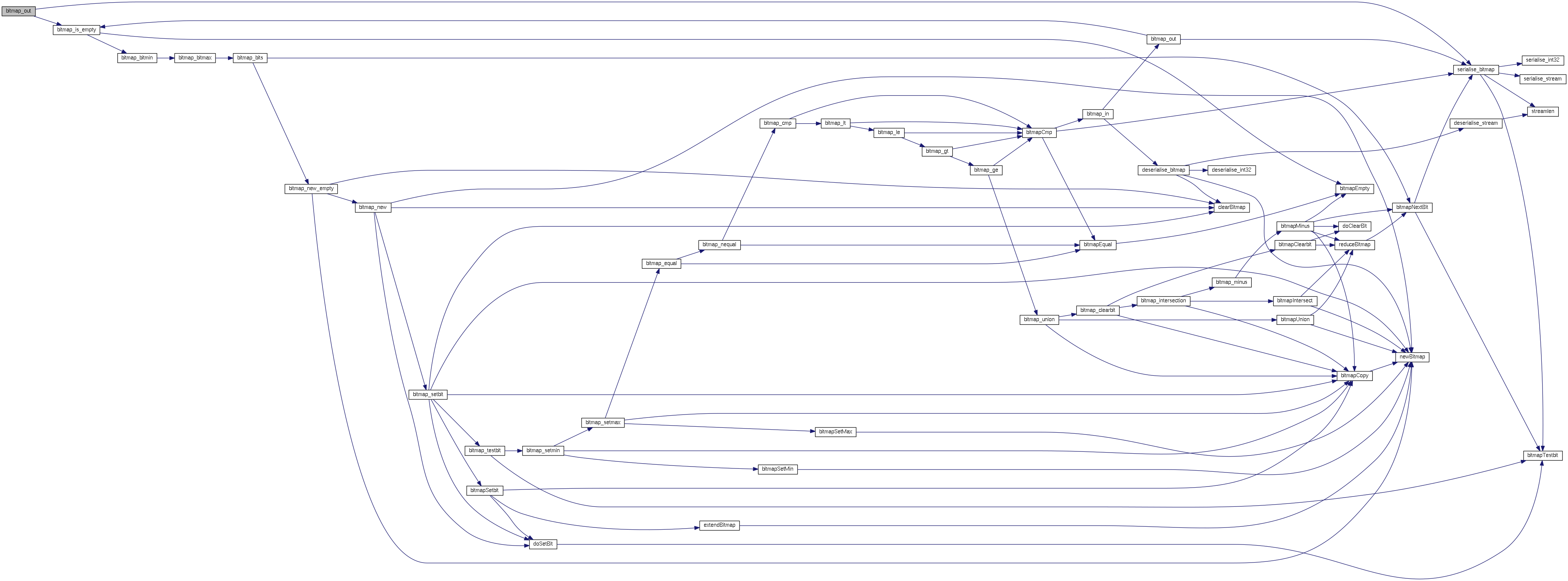
◆ bitmap_setbit()
| Datum bitmap_setbit | ( | FunctionCallInfo | fcinfo | ) |
bitmap_setbit(bitmap bitmap, bit int4) returns bool Set the given bit in the bitmap, returning TRUE. This can be used as an aggregate function in which case the bitmap parameter will be null for the first call. In this case simply create a bitmap from the second argument.
- Parameters
-
fcinfo Params as described_below
bitmap bitmapThe bitmap to be manipulated.
bitno int4The bitnumber to be set.
- Returns
bitmapThe result.
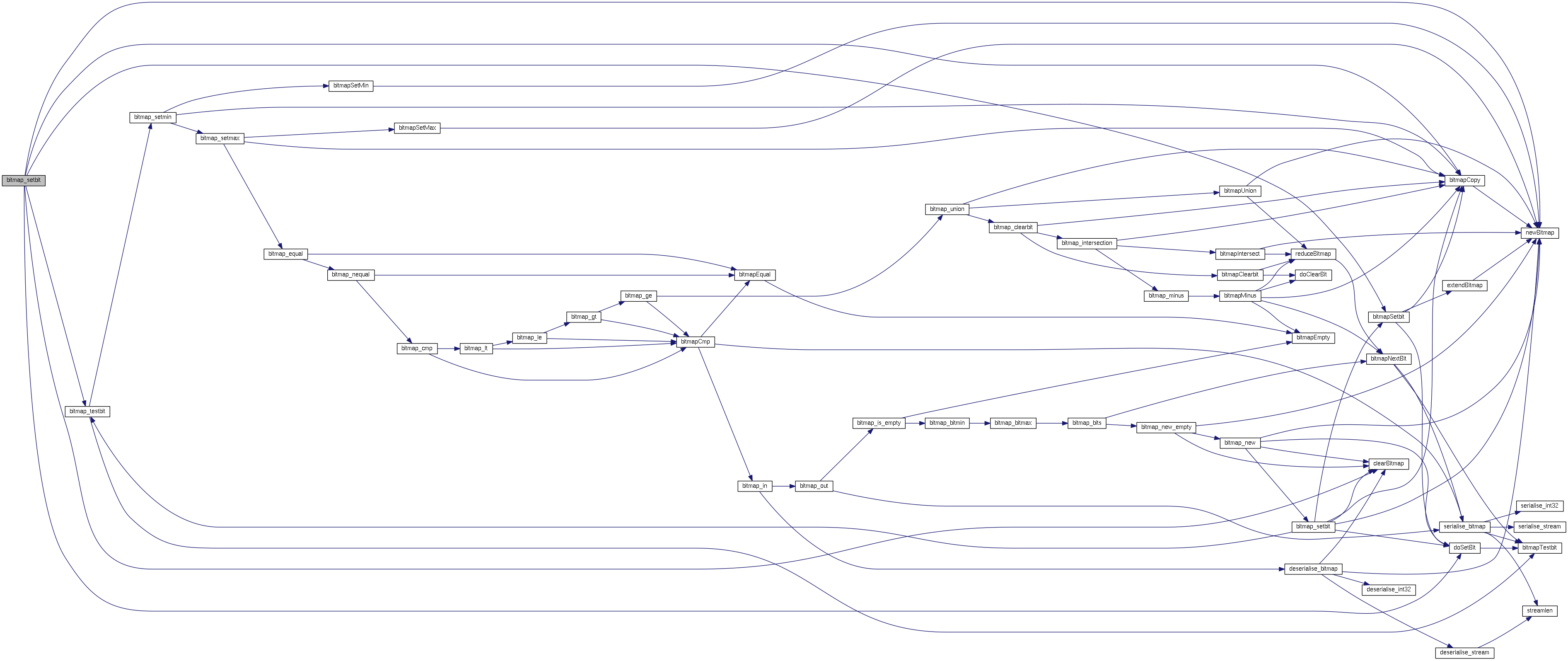
◆ bitmap_setmax()
| Datum bitmap_setmax | ( | FunctionCallInfo | fcinfo | ) |
bitmap_setmax(bitmap bitmap, bitmax int4) returns bitmap Return a new bitmap having no bits greater than bitmax
- Parameters
-
fcinfo Params as described_below
bitmap bitmapThe bitmap to be manipulated.
bitmax int4The new maximum bit.
- Returns
bitmapThe new bitmap.
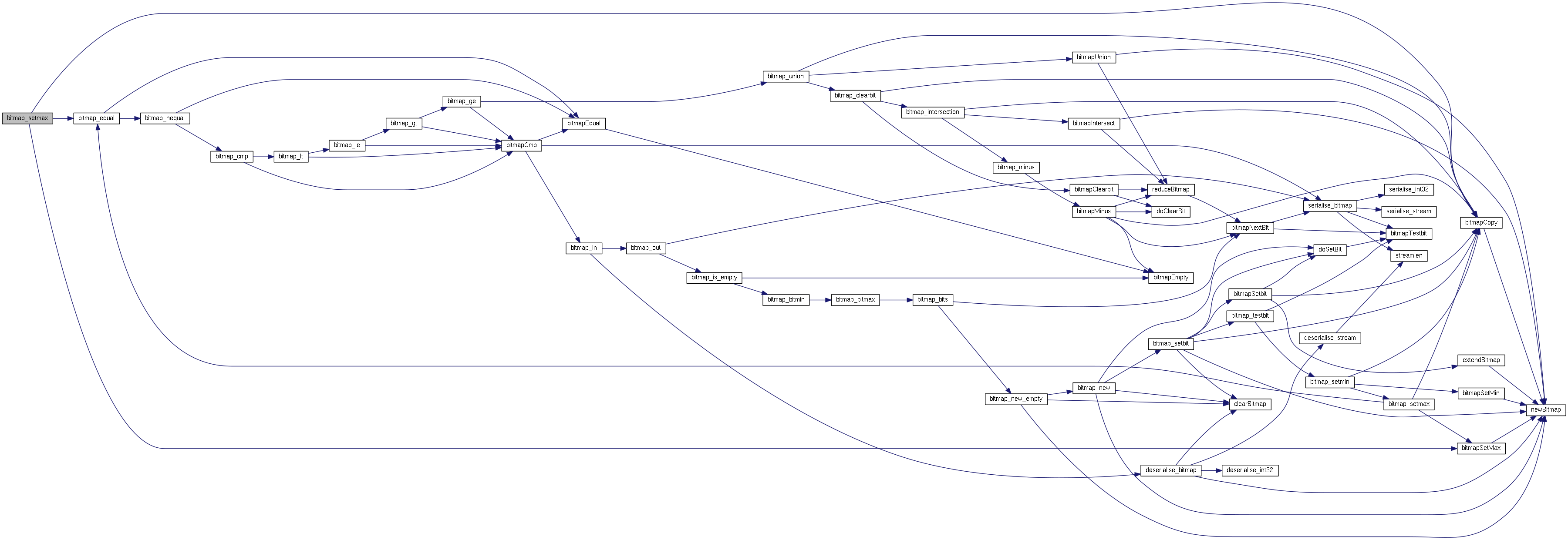
◆ bitmap_setmin()
| Datum bitmap_setmin | ( | FunctionCallInfo | fcinfo | ) |
bitmap_setmin(bitmap bitmap, bitmin int4) returns bitmap Return a new bitmap having no bits less than bitmin
- Parameters
-
fcinfo Params as described_below
bitmap bitmapThe bitmap to be manipulated.
bitmin int4The new minimum bit.
- Returns
bitmapThe new bitmap.
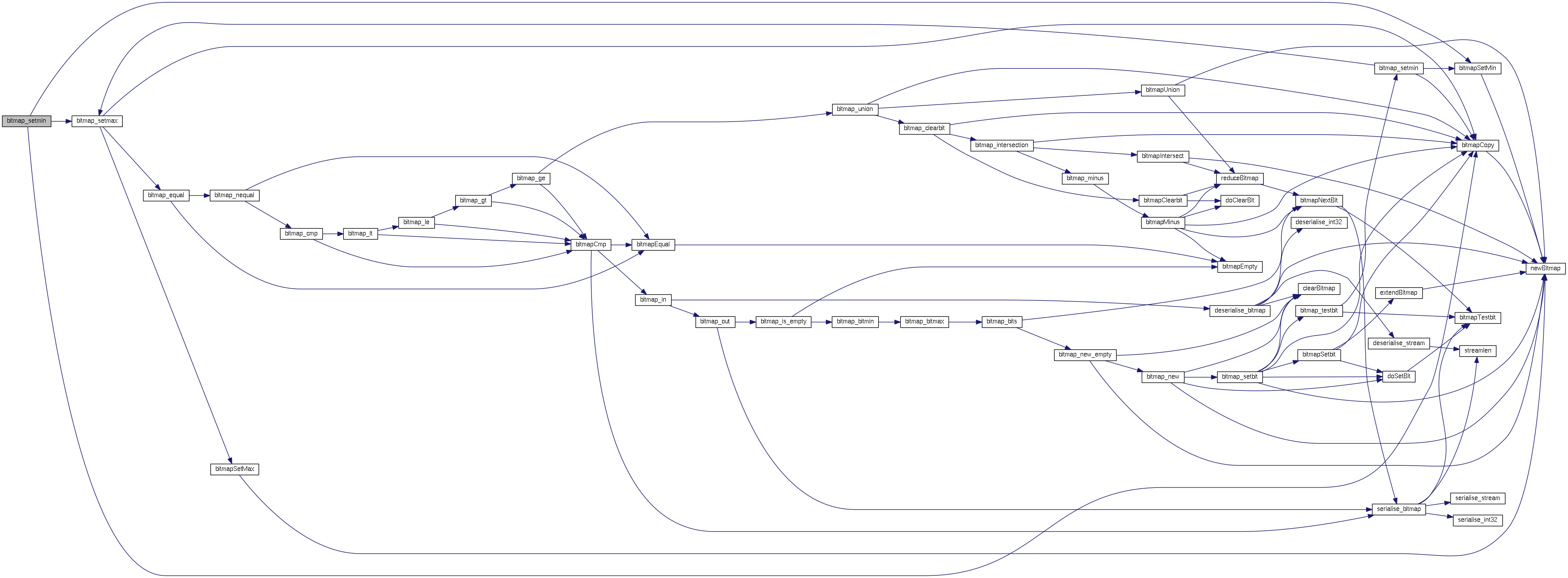
◆ bitmap_testbit()
| Datum bitmap_testbit | ( | FunctionCallInfo | fcinfo | ) |
bitmap_testbit(bitmap bitmap, bit int4) returns bool Test the given bit in the bitmap, returning TRUE if it is 1.
- Parameters
-
fcinfo Params as described_below
bitmap bitmapThe bitmap to be manipulated.
bitno int4The bitnumber to be tested.
- Returns
boolthe truth value of the bit.
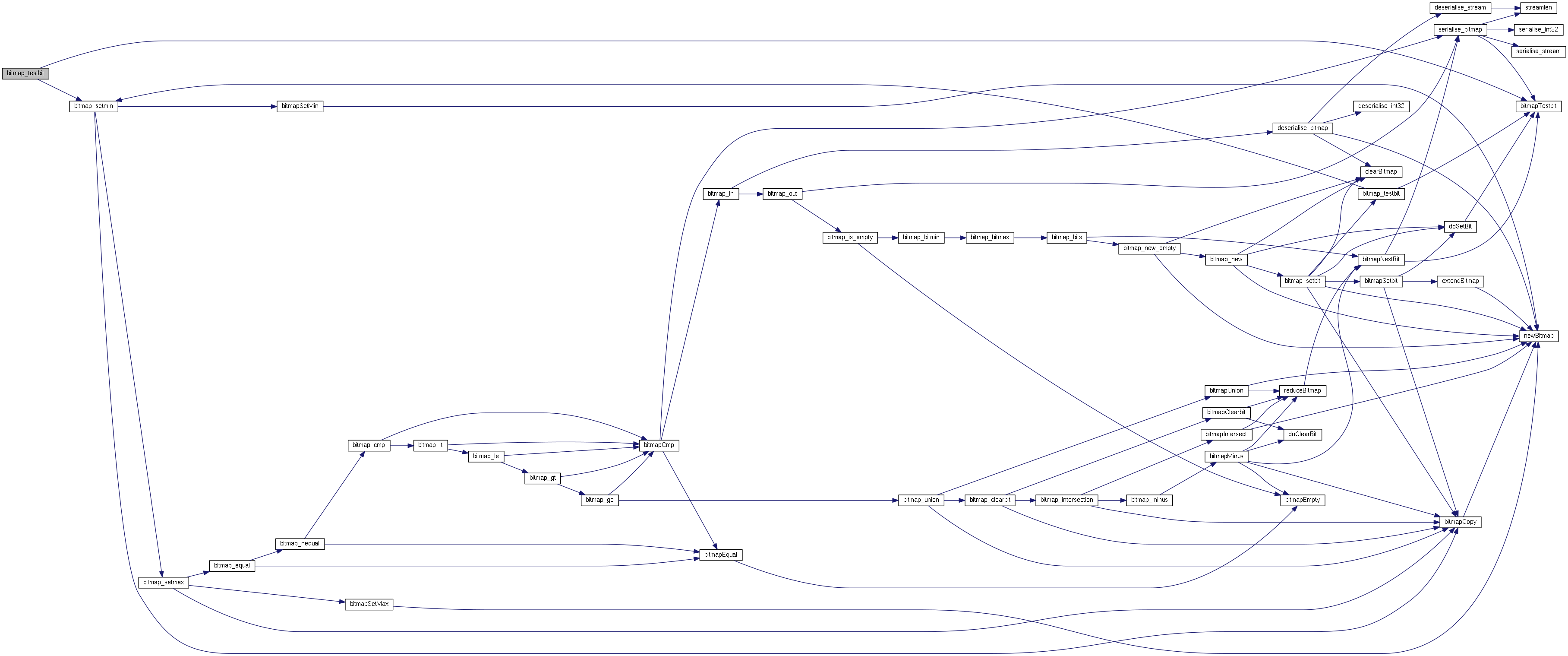
◆ bitmap_union()
| Datum bitmap_union | ( | FunctionCallInfo | fcinfo | ) |
bitmap_union(bitmap1 bitmap, bitmap2 bitmap) returns bitmap Return the union of 2 bitmaps. This can be used as an aggregate function in which case the bitmap1 parameter will be null for the first call. In this case simply return the second argument.
- Parameters
-
fcinfo Params as described_below
bitmap1 bitmapThe first bitmap
bitmap2 bitmapThe second bitmap
- Returns
bitmapthe union of the two bitmaps.

◆ bitmapCopy()
Create a copy of a bitmap.
- Parameters
-
bitmap The original bitmap
- Returns
- Copy of bitmap.

